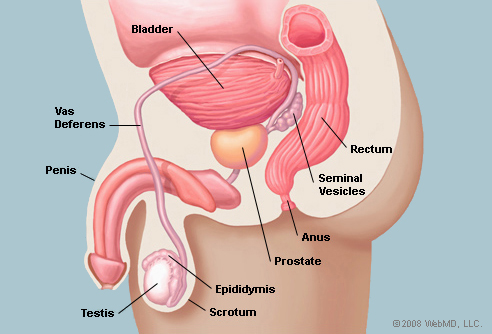Men's Health and the Role of the Prostate
 So if you hadn't already guessed by my articles about testosterone and healthy barbecuing, June is Men's Health Month!
So if you hadn't already guessed by my articles about testosterone and healthy barbecuing, June is Men's Health Month!
Last year I dug into topics like Dad Bod, but this year I thought I'd take it back to basics.
Which means (figuratively) exploring the prostate!
Thanks to awesome initiatives like Movember, we hear a lot about prostate health and preventing prostate cancer. While this is GREAT, I think it's also really important to know what the prostate actually does in the body, and how you can keep in healthy throughout your life.
That Old Walnut: The Role of the Prostate
The prostate is a gland, roughly the size of a walnut, that rests just below the bladder in the male body. It's primary function is to produce seminal fluid, which nourishes and protects semen. When a man ejaculates, the prostate squeezes fluid and sperm into the urethra which is then released as semen.
Under Pressure: Enlarged Prostates
As a man ages his prostate tends to naturally enlarge. The condition is called BPH: benign prostatic hyperplasia, and it's very low-risk. In fact less than 50% of men with the condition will show symptoms.
Due to the location of the prostate (right nest to the bladder), those symptoms can include:
- Dribbling at the end of urinating
- Inability to urinate (urinary retention)
- Incomplete emptying of your bladder
- Incontinence
- Needing to urinate 2 or more times per night
- Pain with urination or bloody urine (these may indicate infection)
- Slowed or delayed start of the urinary stream
- Straining to urinate
- Strong and sudden urge to urinate
- Weak urine stream
Just to reiterate, some prostate enlargement in men is unavoidable - it's a natural part of the body aging. It's when the prostate grows to a size that creates the symptoms above that action may be taken.
Prevention and Prostate Health
While BPH is somewhat normal and mostly manageable, prostate cancer is another matter.
Treatment for prostate cancer can be incredibly painful and disruptive, so many men choose to live with it as long as possible before seeking treatment. It can have a huge impact on fertility and other functions of the male reproductive glands. And, of course, when left unchecked it can result in death.
Prevention of extreme cases of BPH and prostate cancer takes many forms, but most of it comes down to living a health life. A good, plant-based diet, organic as often as possible, avoiding hormone disruptors such as many of our environmental toxins (plastics), and refraining from smoking are key examples.
Another key component of prevention is regular check-ups, and this tends to be the focus of Movember activities. When caught early, prostate issues can be managed for years without having a huge impact on a man's life.
The prostate is a unique gland and performs a vital role in men's health. Awareness of possible risks and a healthy lifestyle are a huge part of keeping it safe and sound.

